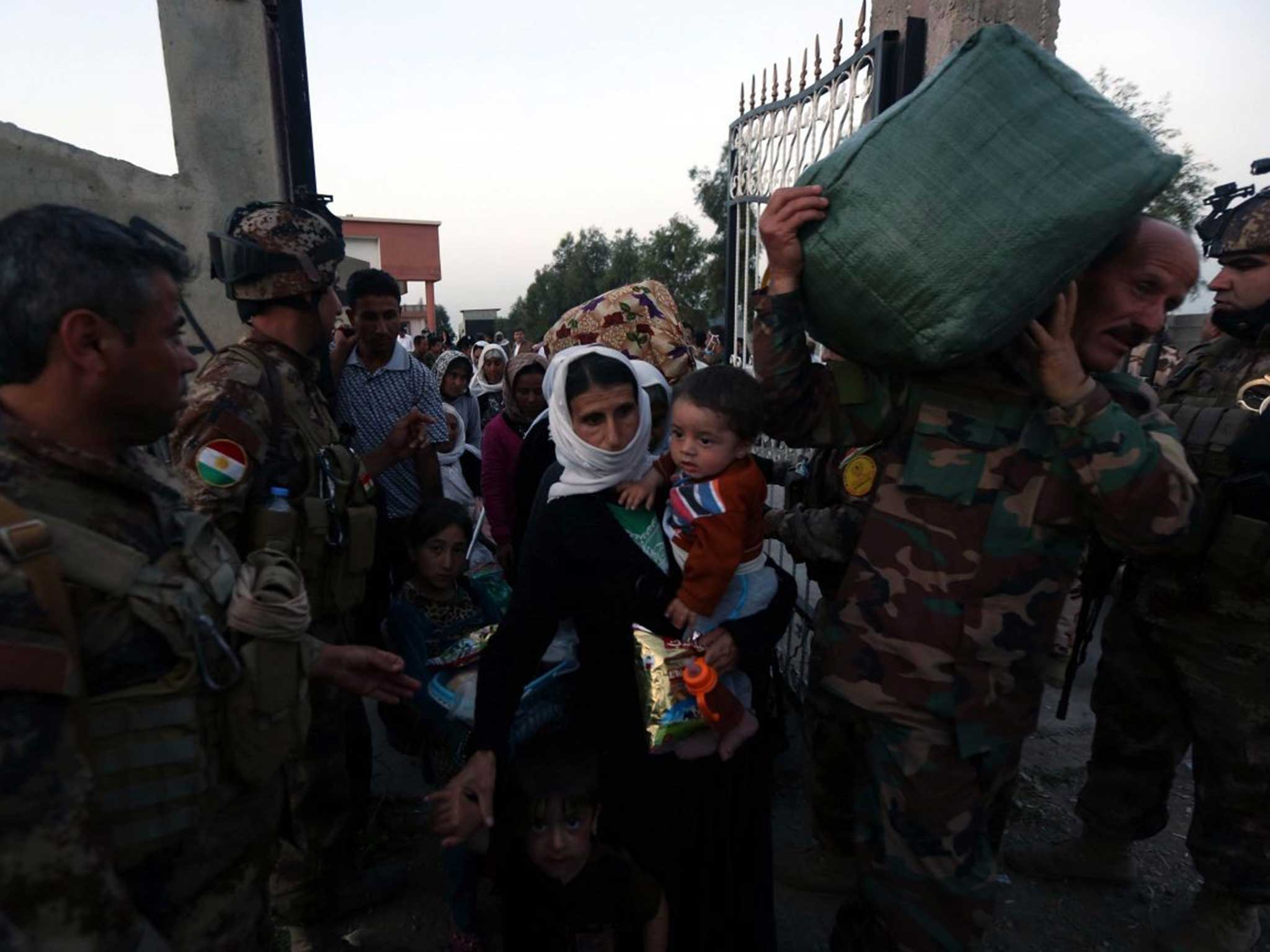Yazidis tell how fearful Isis kept them on move
Captives describe beatings, rapes and children taken by force

Yazidis recently released by Isis have revealed the growing paranoia of the group that held them, telling of death threats for those caught with mobile phones for fear they would communicate with the outside world, and describing how captives were repeatedly moved as Kurdish forces advanced against the jihadist group.
Gawry Rasho, one of 217 mostly elderly and young Yazidis freed this week, told The Independent that on being captured in Sinjar, north-west Iraq, last August as the militants tore through the north of the country, she was taken first to a base in the centre of town where she says she saw thousands of other Yazidi captives. She was then moved, with other women and children, first to the town of Tal Afar, then to Kocho near Sinjar – and then back again. “Isis heard the Peshmerga was coming to attack Sinjar so they moved us back to Tal Afar,” she added.
After taking Iraq’s second-largest city of Mosul, Isis branded Yazidis as pagans, killing hundreds of the minority religion and enslaving thousands more.
Last weekend Isis fighters told Gawry she would finally be released after eight months of captivity, but just before she was allowed to go her seven-year-old daughter was snatched away from her by the militants. Children can be indoctrinated, made to work or fight and in the case of girls become fighters’ concubines.
Power struggle: Isis areas gained and lost
Show all 1“She was crying and they pulled her hair,” said Gawry dejectedly in the courtyard of the Yazidi holy temple of Lallish, where she had come to be blessed and bathe in holy water to cleanse herself after her ordeal.
“I asked for her and they said, ‘If you ask again we will beat you.’ They put us in big cars and if there were any children they took them away by force, except for any who were disabled.”
Since the Isis push in northern Iraq last summer, the Kurdish Peshmerga has fought back, regaining some towns with the help of coalition air support. But Yazidi leaders estimate that at least 4,000 members of their community remain prisoners.
A senior military official from the international coalition against Isis told The Independent that the jihadists were being degraded following their defeat in the city of Tikrit last week. “Isis is on the defensive across the country... We know they are short on fighters, their funding lines are drying up and external support is diminishing,” the official said.
But despite coalition support for Iraqi ground troops Isis remains entrenched in Mosul and is proving difficult to eradicate from Sinjar city where the Kurdish Peshmerga forces, which lack basic training such as life-saving first aid, have been fighting since December.
Gawry was not treated badly herself but watched as Isis fighters, whom she describes as Iraqi men from Tal Afar, selected women almost certainly for sex or enforced marriage. “They treated girls and young women very badly,” she said. “I saw them choose them and take them, and if they refused they would beat them.”
She met Yazidi girls who had been injured after trying to escape “because they didn’t want to be raped or taken by Isis”. Some, she said, had tried to throw themselves off buildings rather than submit themselves to Isis.
The jihadists gave them food including rice, oil, tea and sugar, as well as detergent to wash with, she said, but sometimes the jihadists would disappear to fight and then “they wouldn’t give us food”.
Khero Saeed escaped Isis captivity in Tal Afar with his two-year-old daughter last week, and walked for 50 miles through the night, in a group of 30, guided by phone contact with friends in Kurdistan. The men say their feet were bleeding by the time they reached a Kurdish checkpoint at the end of their journey.
During his incarceration Khero was blindfolded and handcuffed for days on end, he says. “They treated us very violently; if someone tried to escape they would beat us. They said that [the Yazidi religion] is a religion of the devils. You have to convert and believe in Islam. If you refused they would kill you directly.”
“If they find a phone on you they will kill you, they will think you are calling [coalition] aircraft or the Peshmerga.”
He believes he was kept alive because he agreed to pray and because he was working as a shepherd and a farmer for Isis.
At the end of the fugitives’ journey the Peshmerga gave them water, he said. Waiting expectantly with them was the toddler son of one women who had been freed, brought to meet her by relatives who had received word of her escape.
The waiting boy looked small and frightened in a picture, but yesterday was playing contentedly under his mother’s watchful eye.
There is no such content for Gawry, however. As other Yazidi families milled around her, alternately praying and chatting, Gawry said she could not be at peace.
“I feel I am still under the control of Isis because my daughter and other girls are still with them.”
Subscribe to Independent Premium to bookmark this article
Want to bookmark your favourite articles and stories to read or reference later? Start your Independent Premium subscription today.

Join our commenting forum
Join thought-provoking conversations, follow other Independent readers and see their replies